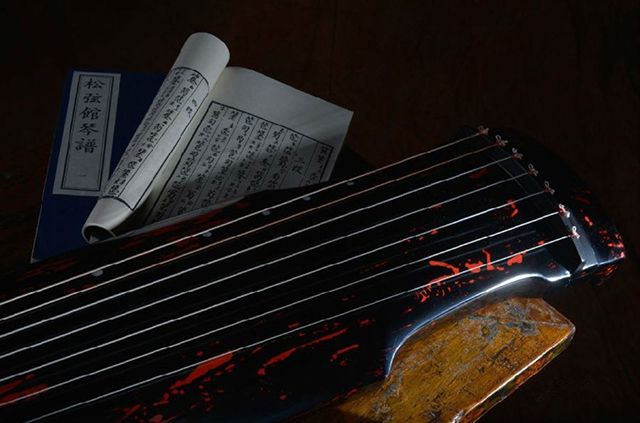Guqin Avoidance Guide: Three Points to Select Unqualified Guqin
171 views · Organized by 琪琪 on 2022-06-26
In daily life, students ask me the most questions besides guqin learning is how to buy guqin? What kind of guqin is an unqualified guqin? Today I will teach you to recognize the "true face" of unqualified guqin.

1. Play the board
The noise generated by the collision between the strings and the piano surface generally occurs when we press the strings or play the empty strings to disperse the sound. It is usually caused by the deformation of the piano surface and the lower body of the piano. If a new guqin plays the board, there is no doubt that it is an unqualified guqin.
2, evil sound/kill sound
If the piano surface is not flat, then when the strings are pressed, the strings and the piano surface will produce a harsh noise. Like playing the board, the presence of a shaky sound indicates that the violin is unqualified or seriously deformed. .
3. Anti-finger
The strings and the surface of the piano are too high, and you will feel pain and difficulty in your hands when pressing the strings. It can be said that this piano is anti-fingered. Playing the anti-fingered piano for a long time not only hurts the hand but also affects learning.
Therefore, a qualified guqin must at least meet the three requirements of not playing the board, not resisting fingers, and no evil sound, otherwise this qin is an unqualified guqin, and it can also be called the "artifact" of the guqin circle.
Involving musical instruments
Guqin (pinyin: Gǔ Qín) is a traditional Chinese musical instrument with a history of at least 3,500 years. Guqin is also known as Yaoqin, Yuqin and Seven-stringed Qin. The guqin has 13 emblems that mark the rhythm, and is also a ritual and musical instrument. It belongs to the silk in the octave. Guqin has a wide range, deep timbre and long aftertone.
Guess you like
Organized by 未知领地 on 2024-03-17
When selecting a guqin, the timbre quality is often the primary criterion to judge its quality, because the timbre is not only related to the artistic expression of the guqin, but also deeply rooted in the unique pursuit of music aesthetics in traditional Chinese culture. Here are some basic timbre elements to consider when choosing a guqin.
read >>
Organized by 卷鹅 on 2024-03-14
With the arrival of the hot summer, for the guqin friends, how to do a good job in the hot and humid season of guqin maintenance is particularly important. Guqin as a traditional Chinese wooden chord instrument, its material is very sensitive to changes in temperature and humidity, so the correct maintenance of guqin in summer can not only extend the life of the instrument, but also maintain its pure timbre.
read >>
Organized by 雨童 on 2024-03-14
Guqin, as an ancient and rich cultural instrument in China, its playing techniques pay attention to the integration of body and mind, rhythm and emotion. In the process of learning Guqin, there is a set of sixteen words that condense the wisdom of countless piano players. They are: "Light, loose, slow, even, Tian, light, elegant, beautiful, bright, mining, quiet, far, ancient, clumsy, middle, and".
read >>
Organized by 迦夜 on 2024-03-13
Guqin, as one of the oldest plucked instruments in China, the beauty of its rhyme lies not only in the pleasant tone, but also in whether it can pop out the kind of "ancient flavor" that has traversed thousands of years.
read >>
Organized by 梦昱 on 2024-03-13
In the pursuit of Guqin skills on the road, many qin friends may encounter such a problem: despite putting in a lot of time and energy to practice hard, but the pace of progress does not seem to be as obvious as expected. This phenomenon not only dampened the enthusiasm of learners, but also triggered deep thinking on the way to improve guqin skills.
read >>

 渝公网安备 50010702504639号
渝公网安备 50010702504639号